When I first started blogging, I wondered if there was really enough material to sustain a blog focused solely on the South African craft beer scene. Here’s a spoiler: there is.
For the past year I’ve had this irritating checklist of blog post ideas saved in my phone, but somehow I never seem to get around to writing them. Something always comes up – a new beer released, a cool brewery opening, a fest ticket giveaway to share or a news story that I feel the need to rant about. I’m determined to get rid of this list before we get too far into 2016. So here are a bunch of random thoughts all spewed out in list format.
 1) Homebrew and craft beer are not the same thing
1) Homebrew and craft beer are not the same thing
“I know this”, I hear you cry – but not everyone seems to. I often hear restaurant owners talking about a new homebrew they have on tap. Don’t get me wrong – I know homebrewers whose beers are better than many commercially available ales. But I think when a lot of people hear the word ‘homebrew’, they think of the sour crap they fermented on a sunny windowsill from a kit back in 1989 and I suppose this could put them off the idea of wanting to taste the restaurant’s ‘homebrew’. As I say, many homebrews are awesome, but it is worth giving craft/microbrewers the respect they deserve for taking the plunge and taking their hobby to a professional level. It kind of annoys me anyway, so I thought I’d mention it.
2) Passing mistakes off as other styles is naughty
I’ve sampled a number of “Lambics” in South Africa. I strongly suspect that none of them were cooled in a koelschip/coolship (a shallow, open vessel). Nor were they aged for years in well-loved barrels, then served sans carbonation (though one brewer did spend weeks searching out the typical old, aroma-less hops to add to his intentionally sour beer). In short, they were not Lambics at all – in most cases they were what is technically known among beer circles, as fuck ups. It happens to everyone – Shawn, my husband, once had a dodgy fermenter which ruined a batch of wheat. We chucked a load of frozen (well, previously frozen) strawberries in it, which covered up the nasty and made it quite a drinkable brew. What we didn’t do was label it as a Berliner Weiss and sell it at a higher price because it’s a speciality beer. Own your mistakes – drink them yourselves or if you must sell them, tell people you screwed up and are trying to turn it around. Stop pulling the wool over the consumers’ eyes. It’s not cool.

Available at http://www.beershirts.co.za/
3) You should sell beer t-shirts in women’s sizes
Women like beer you know, and they also like wearing beer shirts at festivals. They don’t particularly care for oversized men’s shirts that make them look like the side of a house, but for some reason, so few brewers sell shirts in ladies’ sizes. And while I’m at it, you should sell beery tank tops. It’s hot in South Africa and beer-themed tank tops for women would sell well. But they probably shouldn’t be pink. And they should be in realistic sizes, not designed for the flat-bellied, big-boobed, IPA-swigging woman of your dreams…(apologies to female brewers reading this – but if you’re not selling lady-sized versions of your beer shirts, then shame on you).
4) Sticking to a recipe is a good idea
If you’ve added a beer to your core range, and it’s a good beer, that beer will gain a following. Those drinkers come back to your brewery, or go back to the liquor store to buy the same beer again. Sure, recreating the same beer every time is one of the most difficult parts of brewing and we know that sometimes, it’s tough to get the same amounts of the same ingredients, particularly hops. Small diversions are perfectly fine, but I’ve often heard brewers saying “I’m a craft brewer, my beer is different every time. If you don’t like it, you can go somewhere else.” And believe me, they will…
5) Pretty much everyone puts “chemicals” in their beer
If you treat or change your water in any way – and most brewers do (often to get a specific water profile that’s better suited to a certain style of beer), then technically you’re adding chemicals to your brew. Potassium metabisulfite, calcium sulfate, sodium bicarbonate – sound pretty chemically don’t they? But all can be used to alter water during the brew (to reduce chlorine content, accentuate bitterness and raise the mash pH level respectively). So do SAB add chemicals to their beer? Sure, but then so does the above avergage homebrewer. Do SAB add things to preserve their beer? I think that’s wine your’e thinking of. Do they add harmful chemicals to make Castle ferment in 24 hours? They wish. Is there some mystery ingredient added to stop you getting a hangover? You wish. Of course, I don’t know everything that SAB – or indeed any other brewer in SA – adds during the brewing process. I will email to see if they will tell us. A couple of years ago, a US food blogger went on a vendetta to get AB-Inbev to disclose all of the ingredients in their beers. This post – entitled ‘The Dangers of Dumbassery’ is a great response to that campaign.
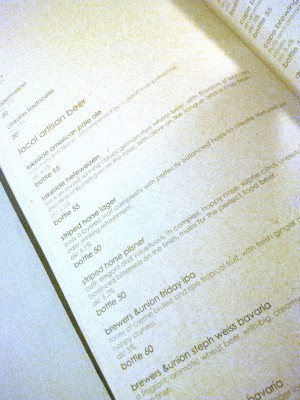
Yeay for beer menus
6) Restaurants: please put beer on the menu
Beer lists are, thankfully, becoming more common than they were a couple of years ago, but I still find that while dozens of wines have their own spot on the menu, alongside everything from a glass of Coke and a cup of rooibos to a strawberry daiquiri, beer still doesn’t always make the cut. Why? Even if you only have a few mainstream beers, I want to know how much you’re charging for them before I order. And if you have any speciality beers at all, put them on the menu. Oh, and train your staff on what they taste like as well, please.
7) Winemakers – just because you can make wine, that doesn’t mean you can brew a beer
I think it’s awesome that there are breweries infiltrating the Cape Winelands, and among them there are some superb beers. I have also tasted some beers that, if they were wines, wouldn’t even scrape into the bottom of the Box Wine Awards nominations. Beer might not have the highfalutin reputation that wine has, but just because you can produce the latter, it doesn’t automatically mean you can make the former. Beer is not a forgiving beast – tiny mistakes such as mistreating your yeast or failing to sanitise everything your wort might touch will turn your beer into something I might hesitate to tip on my garden. But then I suppose you could just call it a Lambic and sell it anyway…
What gets your goat when it comes to beer? Feel free to rant in the comments section below…


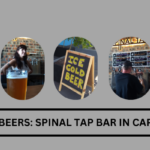
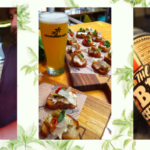


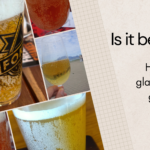
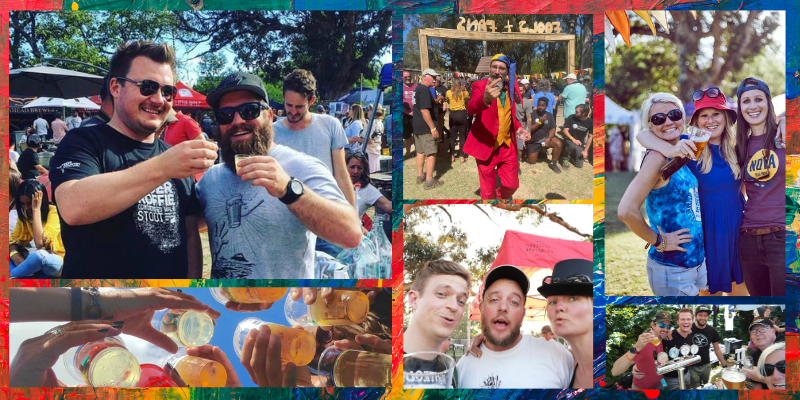

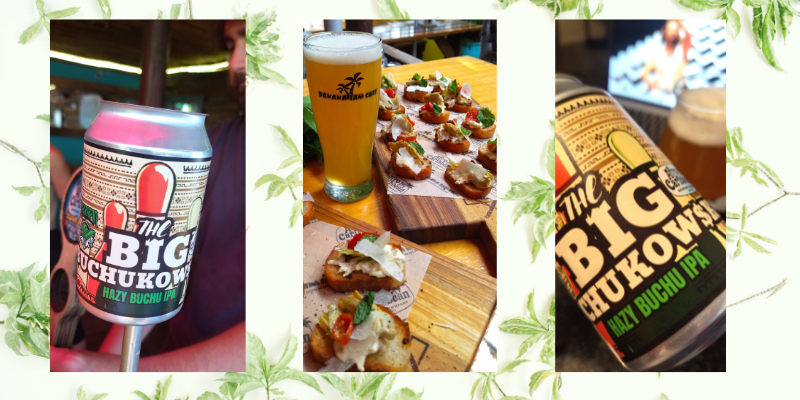
Lucy, you forgot to add that breweries use a deadly chemical (dihydrogen monoxide) in their beers. This same chemical is used in cleaning and as little as a teaspoon full can kill a child! It is currently in all the rivers, dams and seas. It kills thousands of people every year! More information: http://www.dhmo.org/facts.html
[Yes, I know] 😉
Hehe – you’ll start a panic wave!
1. My experience is usually the opposite. Someone saying “I hear you make your own craft beer” or similar. I guess some home brewers refer to their beer as craft, but I like to think that craft is a sector of the commercial beer industry, rather than any beer that isn’t made by a big brewer.
2. While I may have renamed a few of my beers due to unexpected changes, it certainly has never been for profit. A beer going sour isn’t always the worst thing, lack of transparency between the brewer and consumer is. Shame.
3. And how about more of the common sizes for men? Why do I always struggle to find a medium, but there’s always a bunch of XXL lying around?
4. Too many times I’ve enjoyed a beer, and when I buy a bottle to share this new awesome brew with friends, it doesn’t live up, and I feel silly.
5. People freak out too much about anything “Chemically” sounding. I’ve heard of people refusing to eat anything that has “Chloride” in it because Chlorine is bad for you… Don’t tell them what Sodium Chloride is. And Alpha Acids? That can’t be good for you either…
6. There’s nothing worse than pulling teeth to find out what beer a place has. “Craft beer” isn’t a good enough answer either. Not to mention the beer menus that are inaccurate or just wrong. I’ve seen far too many “Indian Pale Ales” out there. (Sometimes printed on the bottle even…)
7. Very few winemakers seem to get it right. Many of them seem to be making very plain, “accessible” beers too. Probably a symptom of wine drinkers superiority complex, that may be all beer is to them.
Good point about the t-shirt sizes – never thought of that!! Maybe you need to eat/drink a lot more to fit into them?
And those alpha acids are dangerous. I’m staying well away… 😉
Yes to beer menus! I’ve had the unfortunate experience of discovering my one little bottle of Bone Crusher was R85!! (more than my meal!) when receiving the bill.
And don’t say you have a “selection of craft beers” when all you ever stock is the same one lager and one pilsner. Oh, and restaurants that don’t serve craft beers are dead to me.
My favourite is when you ask which beers they have and they say “all of them” and proceed to list every beer ever created (Hansa, Castle, Castle Lite, Black Label, Amstel, Windhoek AND Heineken!!!)
Dont forget that Windhoek is imported…
Oh, and also R85!!?? Holy crap – where?? Name and shame!
You forgot:
– telling a bar the beer is sour, them saying “well it’s craft, it should taste like that”
– giving me an ice cold glass to drink an IPA out of. If I’m paying R40 for a beer, I want to taste how the brewer would want it to taste.
– some beer drinkers making fun of/looking down on those drinking more mass produced beer. If that’s what they enjoy drinking, then let them have fun. Sure, try get them to taste your beer and explain why you’re happy to pay more, but after that, leave the person to enjoy their beer. Also, some people can’t afford craft beer all the time.
– I’m surprised you didn’t include anything about establishments being patronising to women. I’ve sat in bars, me and my male friends have ordered an IPA with no comment, then when my female friend orders one, the waiter said “Oh just be careful, it’s very bitter.” Ridiculous.
Thanks for the outlet 🙂
Ooh, I think I might carry a bag of hop pellets around – if any waiter patronises me like that I’ll be like ‘oh no, I like bitter things. I chew on these instead of gum – want to try a few?’. Tee hee.
Thanks for venting – good points all of them!!
Totally agree with you on the T-shirts and Beer menus Lucy! I’ve had that “all of them” thing happen quite a few times up here in Jozi.
My other frustration: not enough beer reviews in the SA beer blogosphere, and of those, not nearly enough of them featuring criticism of bad beer. I know there’s a certain level of enthusiasm required for all craft beer, but bad beer is bad for all of us, so posting only nice reviews ain’t going to help anybody.
I hear you Marcel. I read your post in December and have been giving it a lot of thought. Until now I have tended to ignore the crap and only review the good/the average but maybe it’s time to change that. I figure if I pay good money for bad beer I have the right to do an honest review right? But should I contact the brewer first and give them the opportunity to replace the beer?? It’s quite tricky as the industry is still fairly small and everyone knows everyone… Would be interested to hear people’s thoughts on this? On the one hand, maybe I could save people some cash with honest reviews. On the other, I don’t want to contribute to the downfall of a business. Then again, if you’re putting out bad beer, I guess it’s you (the brewer) who is harming your own business…
“Which of your beers tastes most like Castle Lite?”….. (*insert face palm here) 🙂 I have to be patient here, as craft beer is still a young thing in SA, and people’s palates need to be educated, so I never say anything (but my eyes on the back of my head do roll 😛
When serving beer at a gig, being brushed aside as though I am just a bartender that doesn’t know anything about craft beer, let alone brewing, just because I am a woman, doesn’t go down so well either.
Great article Lucy, it made me smile.
Ah yes, I’ve often heard that in American circles – the master brewer with 15 years of experience is assumed to have been hired to pour beer for the day because she’s pretty and blonde!!
So which of your beers tastes most like Castle Lite?
My usual tactic is to make the correlation of the Castle Lite being a lager, and my Schwarzbier also being a lager. Yes, their eyes are out on stalks when I pour it into a glass, but they almost always ask for a pint or more. Winning the Castle Lite drinkers over, one Schwarz at a time 🙂
My pet hate is when craft breweries try and knock out commercially aligned styles without any of the edgyness craft lovers want. By all means make 80% of your stuff as mainstream as you would like but for goodness sake give us something off centre. Otherwise I am not coming back and thats the long and short of it
Right now my pet peeve in the craft world is most beers have started to taste watered down or there is an explosion in your mouth from the hops, but no malt taste to balance it out.
If the above Megan is the same uber brewer from the KZN midlands, your beer rocks!
That is indeed she!
I have also noticed a few watery brews now that you come to mention it…
Craft Beer has the innate ability to WOW a Craft Connoisseur. Not all breweries are producing WOW Beers. Not nearly enough restaurants showcase the few WOW Beers on the market.
WOW Beers are the ones that started and are currently driving the Revolution.
Give the Connoiseurs something to write home about, give them something to shout from the treetops about. You will receive more of these customers willing to pay for WOW Beers if you provide them for your customers.
I’m not sure if it was mentioned previously, but what gets to me a lot, is when a bottle, or draught, says it is a particular style, and then it is not. I don’t mind if a beer has missed a style slightly, our palates all differ, so that comes into play. But when I’m expecting a double or triple IPA, and all you get is an APA, tasty yes, but not the face-scrunching DIPA that I was excited for (or paid big bucks for), that’s a bit of a downer.
I think it was sort of mentioned with all the “watered down”, “disappointing” comments, but I agree with you. Also beers that just don’t give you a style, or a description of what to expect.
I think I covered this once. The whole ‘I want an IPA in my range, but my customers don’t like very bitter beer so I’m not putting too much hoppage in there’ nonsense. Bah.
Or the inverse, as Bruce pointed out. “I want an IPA in my range, and they’re more bitter, so I’m just going to chuck a whole lot of bittering hops in without much aroma or malt flavour to balance it out”.